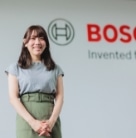
CHASSIS SYSTEMS
CONTROL DIVISION
Rina S.
Platform Software
Engineering Brake Systems
System & Function Technologies
Joined Bosch in 2016
Changed jobs to a supplier to increase market value as an engineer
When I was a student, I majored in programming and electrical/electronic circuits. I wanted to "use programming to make things move". So after graduating from university, I got a job as a software engineer at a Japanese IT company and was in charge of embedded development for car navigation system displays and audio functions. It was an interesting job because it involved "making things move", but when I looked back on my career, I realized that I wanted to expand the scope of my work in the future, and not be limited to just the technology for a specific function. So I started looking for a new job, and Bosch was one of the companies introduced by my recruiting agency.
I didn't know much about Bosch at the time, but I heard that Bosch has an environment in which I could work with people of all nationalities and with a wide variety of backgrounds. Furthermore, I could work with various car manufacturers. In addition, although Bosch is a foreign-affiliated company, it has a caring culture that incorporates the good aspects of Japanese companies. Hearing that sparked me to join Bosch. Through the selection process, I felt the warm culture firsthand and learned more about the work content. I thought that "although I am not good at English, I will do my best after joining the company", and decided to join Bosch.

Challenging a wide range of tasks, from reviewing specifications to logic design and data analysis of test runs
Since joining Bosch, I have been involved in the development of brake systems, and I am currently in charge of the development of regenerative braking control systems for hybrid vehicles. When I first joined Bosch, my boss taught me how automobiles and brake systems worked, but after that, I was entrusted with most of my duties. There is no compulsion to strictly "do this". Instead, you can think about the process yourself and move forward, and you will be generously supported when you face difficulties. I think the appeal of working at Bosch is a good sense of distance and a great deal of freedom to decide.

My position is a system engineer, but my duties include reviewing specifications with customers, system logic design, development and implementation management, application development instructions for actual vehicles, verification of data obtained from test runs, re-adjustment of logic and parameters, etc. The breadth is beyond imagination. I feel that I have acquired an overwhelming number of skills after joining Bosch, such as multi-tasking skills, know-how about working on projects with many engineers in Japan and overseas, business English, and so on.
In addition, every winter, it is customary to go on a long-term business trip to Memanbetsu in Hokkaido. In order to prepare for a presentation to our car manufacturer customers, we go to Bosch's test course in Memanbetsu for test runs to check and adjust the consistency of the brake system. I feel that I am enjoying manufacturing more now because the scope of my involvement has expanded.

Feedback from customers and end users is the source of motivation
A car itself is real hardware. No matter how precisely the logic is built and the parameters are set on the software side, the results may be unexpected when driving the actual car. In addition, the data may change depending upon the driving method. It takes time and effort to verify the data and solve any challenges, but cars are actually hardware so a "real feeling of manufacturing" remains.
In addition, I feel a great sense of accomplishment when customers highly evaluate the completed brake system, and when I see the reactions of end users on video sites and social media sites after the system is installed in vehicles and released around the world.
Above all, the brake system we make is a function that is always used in daily driving. Therefore, you can work while feeling that you contribute to the safety of many people. The various skills and experiences I acquired at Bosch are market-valuable skills that can be applied in any industry or occupation, and have given me great confidence in my career. In the future, I would like to utilize the knowledge of brake systems that I have acquired in my current job to take on the challenge of developing forward-compatible products.















